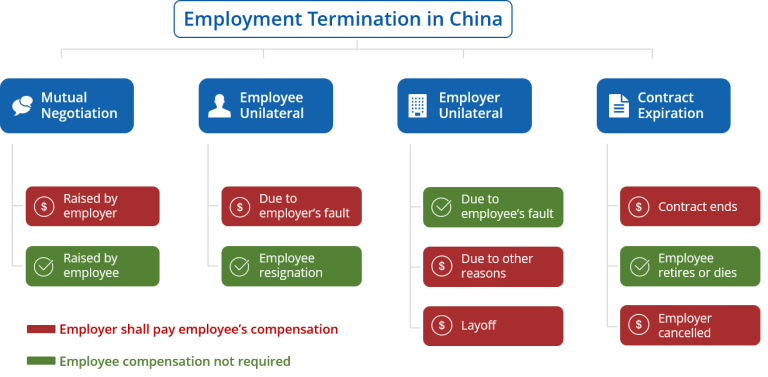Hiring employees in China has been increasingly present in foreign companies’ plans. China’s market opportunities are massively attracting companies to set-up a local presence in China.
The first common step among foreign companies is to hire employees without a legal entity in China. Nevertheless, in order to ensure total compliance and avoid penalizations, it is important to understand China’s employment law and its requirements.
In our practice, we noticed that many of our clients often misunderstand about certain aspects regarding employment relationships in China. Being the reason why we have drafted six of the most common mistakes made by foreign SMEs when hiring employees in China.


Initial contracting
In China, the laws and regulations lean towards the interest of the employee instead of the employer. Even in court and in labor arbitration, the employers bear more burden of persuasion than the employees.
However, companies hiring employees in China should note that any clause in the employment contract that does not violate the mandatory laws and regulations, is valid as long as both parties agrees. Therefore, it is strongly recommended using a professional employment contract template, hence the employer’s interest is protected from the beginning of the employment relationship.
.
Employment termination
One of the most common mistakes for foreign employers when hiring employees in China is employee termination.
Generally speaking, there are four ways to terminate an employment relationship.
- Mutual negotiation
- Employee unilateral termination
- Employer unilateral termination
- Contract expiration
Below is a picture showing all kinds of termination methods.


Please notice that if the employment is terminated using the methods in the red box, the employer shall pay compensation to the employee. If the employment is terminated using the method in the green box, then there will be no compensation involved.
A further issue that should be known by the employer is that there must be solid evidence of unilateral termination through the employer. The employer must prove that the employee is at fault or that there are other reasons for terminating the employment relationship. If there is not enough evidence for that, it is possible that the court or the arbitration may require the employer to pay for double compensation for illegal termination.
The last thing to keep in mind when dismissing a contract, the employee always has the right to request the employer to resume employment.
In some cases, if the employer wishes to terminate the employment relationship, the employee could refuse remuneration and continue the employment relationship. The court may still rule that the employer shall continue regardless of the employer’s objection. Therefore, under normal circumstances, mutual negotiation is the best way forward. Not only to save costs but also to have a stable and mutual agreement for employment termination.
Salary
Usually, the employer will set a fixed amount of salary on the employment contract. It is the standard practice but not the most cost-effective. One way to manage the salary payment is to divide the salary into several parts. A well-designed salary structure can save a lot of costs to the employer and gives the company more flexibility when managing employees.
However, when designing the compensation structure, it is always recommended to rely on professional help, as a poorly designed salary structure can result in costs increases and legal risks.
Overtime
In China, there is a limit to total overtime working hours. In general, overtime working hours shall not exceed more than 36 hours per month.
Second, a proper overtime work policy shall be applied to the whole company. From time to time there will be employees who deliberately decide to stay late in the office and claim overtime while the overtime has not been used for work. Proper overtime work policy could prevent such problems, making sure that overtime is only used for work.
.
Working location
The place of work may seem to be an irrelevant factor for many employers in China because it may seem obvious. But in practice, it could impact the employment relationship in extensive ways.
- For foreign employees, the actual working location shall be exactly the same as the location recorded on the Chinese work permit. On the contrary, it could be deemed as illegal work in China.
- For all employees, the workplace is one of many working conditions. If the employer changes the place of work considerably, for example, from one city to another, the employer and employee must agree on this. If the employee refuses to change the working location, the employer cannot force the employee to do so. Given that case, one option is that the working location remains the same; or the employment relationship ends with an economic compensation favoring the employee.
Probationary Period
Probation is a system for employers to test the abilities of the employees. Although it is considered easier to terminate the employment during the probation period, certain conditions shall still be met.
One of the conditions to terminate employment during probation is to prove that the employee does not meet the job requirements. However, the employer shall have detailed and practical job requirements first, and records showing that the employee does not meet them. Please note that the requirement must be measurable instead of a vague concept.
Probationary period length in China
In China, the length of the probation period depends on the term of the employment contract.
- If the employment contract term is more than three months and less than one year, the probation period shall not exceed one month.
- If the employment contract term is more than one year and less than three years, the probation period shall not exceed two months.
- If the employment contract term is more than three years, the probation period shall not exceed six months.
At the same time, if an employer only sets a probation period but did not mention the length of the employment in the labor contract; the probation period is considered as the length of the employment and there will be no probation period.
To Sum-up
Below are a few common mistakes that frequently occur when hiring employees in China. These flaws can affect the employment relationship from start to finish. The employment relationship in China is highly localized and entering an employment relationship without professional advice and assistance could lead to a large legal risk and additional costs. In order to avoid these mistakes and have a stable employment relationship, it is strongly recommended that you use a professional employment contract and hire a professional HR company to help you through the process.
What is HROne?
HROne is a non-state-owned consulting firm based in Shanghai that helps foreign companies enter and develop their operations in Mainland China, Hong Kong, Taiwan, and Macau.
Our multilingual team serves clients with high-quality, compliant legal, and administrative HR solutions. We provide efficient local execution, customized services, and cost-effective results.
If you have any further questions, please get in touch with our consultants.
Our mission is to manage and reduce HR, payroll, & employment risks while ensuring compliance for foreign companies in China.
Get the guide to hire employees in China in 2021 and stay updated on the latest news about HR, employment, and business expansion in China!
Thank you!
You have successfully joined our subscriber list. Check your email to get your copy of the guide to hire employees in China!
